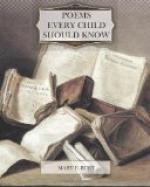My little Maedchen found one
day
A curious something in her
play,
That was not fruit, nor flower,
nor seed;
It was not anything that grew,
Or crept, or climbed, or swam,
or flew;
Had neither legs nor wings,
indeed;
And yet she was not sure,
she said,
Whether it was alive or dead.
She brought it in her tiny
hand
To see if I would understand,
And wondered when I made reply,
“You’ve found a baby
butterfly.”
“A butterfly is not like this,”
With doubtful look she answered
me.
So then I told her what would
be
Some day within the chrysalis:
How, slowly, in the dull brown
thing
Now still as death, a spotted
wing,
And then another, would unfold,
Till from the empty shell
would fly
A pretty creature, by and
by,
All radiant in blue and gold.
“And will it, truly?”
questioned she—
Her laughing lips and eager
eyes
All in a sparkle of surprise—
“And shall your little Maedchen
see?”
“She shall!” I said.
How could I tell
That ere the worm within its
shell
Its gauzy, splendid wings
had spread,
My little Maedchen would be
dead?
To-day the butterfly has flown,—
She was not here to see it
fly,—
And sorrowing I wonder why
The empty shell is mine alone.
Perhaps the secret lies in
this:
I too had found a chrysalis,
And Death that robbed me of
delight
Was but the radiant creature’s
flight!
MARY EMILY BRADLEY.
FOR A’ THAT.
Robert Burns, the plowman and poet, “dinnered
wi’ a lord.” The story
goes that he was put at the second table.
That lord is dead, but Robert
Burns still lives. He is immortal.
It is “the survival of the fittest”
“For a’ That and a’ That”
is a poem that wipes out the superficial
value put on money and other externalities.
This poem is more valuable
in education than good penmanship or good spelling.
(1759-96.)
Is there, for honest poverty,
That hangs his
head, and a’ that?
The coward slave, we pass
him by,
We dare be poor
for a’ that;
For a’ that, and a’
that,
Our toils obscure,
and a’ that;
The rank is but the guinea’s
stamp,
The man’s
the gowd for a’ that!
What though on hamely fare
we dine,
Wear hoddin-gray,[1]
and a’ that;
Gie fools their silks, and
knaves their wine,
A man’s
a man for a’ that!
For a’ that, and a’
that,
Their tinsel show,
and a’ that;
The honest man, though e’er
sae poor,
Is king o’
men for a’ that!
Ye see yon birkie[2] ca’d
a lord,
Wha struts, and
stares, and a’ that;
Though hundreds worship at
his word,
He’s but
a coof[3] for a’ that;
For a’ that, and a’
that,
His riband, star,
and a’ that,
The man of independent mind,
He looks and laughs
at a’ that.




